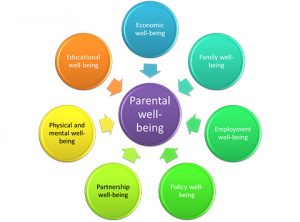子育て期間の親のウェルビーイングに関する日独比較調査
2011年1月年 - 2015年10月
In August 2013, the news media reported that a survey from June 2013, conducted by Japan’s Cabinet Office, revealed that 71 percent of the respondents (6,075 people age 20 and up) were “satisfied” or “reasonably satisfied” with their lives. Yet, in international comparison, Japan’s level of life satisfaction is low. According to the OECD Better Life Index, Japan ranks 27th out of 36 countries, a ranking that has declined steadily over the years (. Furthermore, people who have children may be less satisfied than those who do not. A 2012 Cabinet Office survey on well-being of young parents in their twenties and thirties found that female respondents who are mothers are less satisfied with life than those who are not mothers. Interestingly, no such difference could be seen between male respondents who are fathers and those who are not. The difference between mothers and fathers, however, is striking – with mothers having lower life satisfaction than fathers. So why does the life satisfaction of Japanese parents – particularly mothers – seem low compared to those who are not parents?
In Japan, like in other post-industrialized societies, expectations for “successful” parenting are much higher today than they were three or four decades ago. Additionally, raising a child has become more costly in terms of both time and money. These elevated costs, together with the rising opportunity costs for women opting for motherhood, are strongly correlated with the fertility rate in Japan. As the country’s low fertility rate is considered a major demographic problem by policy makers, it is imperative that they better understand parents, particularly those with young children who require a high degree of care.
Our study examines parental well-being in depth by asking (1) what influences the levels of happiness and life satisfaction of mothers and fathers in contemporary Japanese society, (2) what elements of parents’ lives – such as health and stress, personality, employment situation, material standing, education level, partnership and/or social networks – influence their wellbeing, and (3) how Japanese family policies fare in this relationship. Within the existing research on happiness and well-being in Japan, we have identified four main gaps:
- Few surveys have a particular focus on the well-being of parents.
- No study includes an all-encompassing analysis of all the different dimensions of well-being.
- Fathers are under-represented in most surveys and analyses, as most surveys focus on married.
- Few Japanese surveys on well-being have been conducted in order to be compared with other countries.
Parental well-being is a key concept in our study, which develops a model of parental well-being based on the assumption that the interplay of various aspects of subjective well-being in conjunction with objective life circumstances affects the well-being of parent(s) – and in due course the development of their children as well.
For this study, we conceptualize parental well-being as constituting the following seven dimensions: (1) material well-being, (2) parents’ education and educational aspirations for their children, (3) employment satisfaction, (4) health and personality, (5) social networks, (6) sense of support provided by family policies, and (7) relationship satisfaction. Our study compares fathers and mothers, focusing on the following aspects:
- Levels of satisfaction with their lives as parents.
- Values regarding parenting, social relationships, and life in general.
- Differing life circumstances, such as employment, education, etc.
In 2009, the Ravensburger Stiftung, a foundation established by the German game company Ravensburger, sponsored a nationwide, representative survey on parental well-being in Germany. TNS Infratest Sozialforschung conducted the survey in face-to-face interviews in April and May 2009 under the auspices of Hans Bertram (Humboldt University of Berlin) and Katharina Spiess (DIW German Institute for Economic Research). In Japan, the German Institute for Japanese Studies Tokyo (DIJ) and a team (at the time represented by Noriko Goto, Junko Takaoka, and Satoko Tamura) from the Benesse Educational Research & Development Institute (BERD), the research institute of Benesse Corporation, a leading provider of educational services for children and youth, joined forces in order to mirror this German survey in Japan. Shin Joho Center, Inc. conducted the survey as a postal survey in January and February 2012, after a significant delay due to the triple disaster of March 2011.
External project funding by:
Benesse Corporation (2012)
German Research Foundation (DFG) (2014-2016)
Links:
University of Vienna, Austria
Ravensburger Survey
- http://www.ravensburger.de/ueber-ravensburger/stiftung/aktuelles/elternsurvey-2010/index.html
- http://www.bmfsfj.de/RedaktionBMFSFJ/Broschuerenstelle/Pdf-Anlagen/Familienmonitor-22-Das-Wohlbefinden-von-Eltern,property=pdf,bereich=bmfsfj,sprache=de,rwb=true.pdf
Benesse ベネッセホールディングス ベネッセ教育総合研究所 次世代育成研究室
Contact:
Barbara Holthus, holthus@dijtokyo.org or barbara.holthus@univie.ac.at
http://japanologie.univie.ac.at

 バーバラ・ホルトス
バーバラ・ホルトス